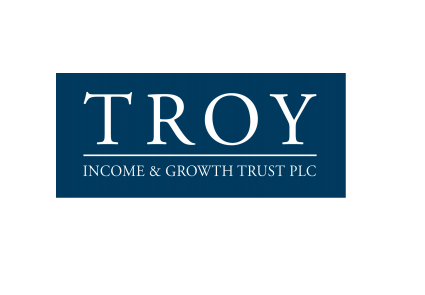Troy struggles as UK economy recovers – Troy Income & Growth failed to match its benchmark over the 12 months ended 30 September 2021. The trust produced a return of 10.2% in NAV terms and 9.6% in share price terms. This compares to 27.6% for the All-Share Index. This has dragged down the fund’s long-term track record, putting it behind the benchmark over three and five years.
The chairman explains “Following the positive vaccine news last November, more economically sensitive areas of the market such as energy, metals & mining, and banks have undergone a sustained period of strong performance. This reflects positive sentiment on economic reopening, along with widespread commodity inflation and expectations of interest rate rises that have dominated markets this year. These conditions have been to the detriment of defensive/quality companies’ share prices, which had generally performed strongly in the prior 12 months. Given the Company’s overwhelming exposure to the latter category of companies, relative performance has been poor.”
Shareholders had further pain in that they now have a much reduced dividend. The dividend for the year totalled 1.96p, down 29.5% from 2.78p for 2020. [On this basis, the shares now yield 2.44% which puts a big question mark over whether this should still be considered an income fund.]
The company bought back a net 26.8m shares over the period and this succeeded in keeping the discount close to asset value.
Extract from the managers’ report
“On an absolute basis, Consumer Discretionary was the largest positive contributor, with the share prices of WH Smith, Compass, and Next rising strongly in the wake of vaccine news and the subsequent rebound in economic activity. Several Financials holdings benefitted similarly from the rapid shift in sentiment, with both St James’s Place and American Express rising >60% over the period. Large, quality, technology-focussed companies such as RELX and Paychex, who potentially face enhanced demand in a post-pandemic world, have also contributed strongly. In aggregate, Consumer Staples had a modest negative impact on performance, however, there were divergent fortunes within the sector; Diageo was the single largest positive contributor to the portfolio, rising 39% as the market anticipated a return in recreational activity and thus alcohol demand. Meanwhile Unilever and Reckitt were the largest drags on performance. The rapid shift in performance for Reckitt is particularly notable; earlier in the pandemic it had been among the ‘COVID winners’ with its disinfectant brands, but vaccine news reversed sentiment rapidly. The company has also suffered from a very mild flu season in the face of global lockdowns, greatly reducing demand for their cold and flu remedies.
Despite generating a c.10% return over the year, the portfolio significantly lagged the market over the 12-month period. On a relative basis (compared to the FTSE All-Share), the largest detractors by sector were the Company’s differing Financials exposure, overweight position in Consumer Staples, and differing Industrials exposure. As noted, the dominant theme was a lack of exposure to companies most dependent on the economic cycle. The UK market is for instance heavily exposed to large mining, energy and resource stocks. Companies in these industries account for c.25% of the FTSE All-Share’s total market cap. The Managers do not typically invest in these sectors, preferring less cyclical and capital-intensive companies. As such, the portfolio has generally struggled to match the returns of the market in periods in which stocks in these sectors strongly outperform. The past year perfectly reflects one such period.”
TIGT : Troy struggles as UK economy recovers
